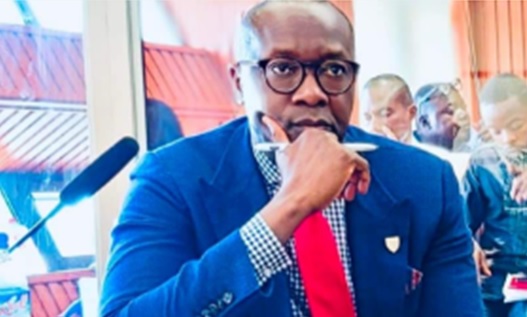MONROVIA, LIBERIA – Senator Amara Konneh of Gbarpolu County has emerged as a prominent voice in Liberian politics, as noted by Liberian journalist Socrates Smythe Saywon, who has examined several comments made by the Senator.
Senator Konneh boldly confronts pressing issues since assuming office in the national legislature. With a steadfast commitment to accountability and transparency, he fearlessly critiques government actions and champions change.
Recently, he spoke out against several issues plaguing Liberia, including the accumulation of garbage in Monrovia and the inadequate electricity supply from the Liberia Electricity Corporation. As a former Finance Minister, he also scrutinized the 2023/2024 draft national budget, highlighting key facts to inform citizens about the country’s economic situation.
One of Konneh’s major concerns was the decline in budget revenues from major economic sectors, despite reported economic growth. He emphasized the need for transparency in budget management, revealing discrepancies such as reported budget surpluses while borrowing from the Central Bank to cover public sector wages.
The former Finance Minister outlined several key points about the budget currently under discussion in the Legislature:
1. The Liberian economy showed growth of approximately 5.01% in 2021, 4.81% in 2022, and 4.58% in 2023 (according to IMF and World Bank data).
2. Despite these growth figures, the contributions of nearly all major economic sectors to budget revenues declined, with notable exceptions such as Maritime (shipping) and a few smaller sectors. Some sectors experienced a significant decline, with Agriculture, forestry, and mining being particularly affected.
3. The Telecom sector also saw a decrease in contribution. For instance, there were approximately 3.6 million mobile phone connections in Liberia in 2021, contributing $8 million in taxes to the budget in 2022. However, this declined to $5.7 million in 2023 and is projected to be $6.2 million in 2024.
4. Additionally, the previous administration reported “budget surpluses” over the past three years, while simultaneously borrowing from the Central Bank to cover public sector wages for November and December 2023.
Furthermore, Konneh did not hesitate to address governance issues within government agencies, particularly the National Social Security and Welfare Corporation (NASSCORP).
He raised objections to the misuse of pension funds for purchasing vehicles for government officials, calling for accountability measures and the resignation of the Minister of State and Chief of Staff to President Boakai, Hon. Sylvester Grigsby. Grigsby, who served as a Senior Advisor to President-elect Boakai, directed these purchases outside of the Public Procurement and Concession Commission (PPCC) and Public Finance Management (PFM) laws. Konneh emphasized the detrimental governance practice of using State-Owned Enterprises (SOEs) as slush funds. He reiterated recommendations for President Boakai to take decisive action:
1. Seriously reprimand NASSCORP’s Director General.
2. Instruct the Minister of Finance to reimburse NASSCORP the full costs of the vehicles from the Ministry of State’s budget.
3. Request the resignation of the Minister of State.
Konneh emphasized that the purpose of NASSCORP is to manage workers’ Social Security trust funds by receiving payroll taxes, paying out benefits, and investing any surplus in special government-backed investments. He stressed that it is unacceptable to utilize pensioners’ funds as a slush fund for government operations.
However, today, Senator Konneh persists in amplifying his message on social media, especially on Facebook. He delivered a powerful statement, saying, “In my country Liberia, history never repeats itself. Liberians always do.” He highlighted the tendency of leaders, both elected and appointed, to repeat the mistakes of their predecessors, while their loyal supporters defend them unquestioningly.
Konneh’s stance is clear: he refuses to align himself with any party agenda in the Senate. He believes that true change in Liberia requires courage, a courage often lacking in the political landscape. He emphasizes that while many desire change, few are willing to risk losing powerful allies to achieve it.
“Don’t confuse elections with change,” Konneh asserts. He urges his fellow citizens to push for meaningful change, even if it means standing alone. Independence, according to Konneh, is essential in fostering real progress and development for Liberia.
As Senator Amara Konneh continues to advocate for change and independence in Liberian politics, his message serves as a rallying cry for citizens and leaders alike to prioritize the nation’s well-being above personal or political agendas.







